Kernel(s) for Problems with No Kernel: On Out-Trees with Many Leaves
Peer reviewed, Journal article
Published version

View/
Date
2009Metadata
Show full item recordCollections
Original version
Leibniz International Proceedings in Informatics 2009, 3:421-432 https://doi.org/10.4230/lipics.stacs.2009.1843Abstract
The {\sc \(k\)-Leaf Out-Branching} problem is to find an out-branching, that is a rooted oriented spanning tree, with at least \(k\) leaves in a given digraph. The problem has recently received much attention from the viewpoint of parameterized algorithms. Here, we take a kernelization based approach to the {\sc \(k\)-Leaf-Out-Branching} problem. We give the first polynomial kernel for {\sc Rooted \(k\)-Leaf-Out-Branching}, a variant of {\sc \(k\)-Leaf-Out-Branching} where the root of the tree searched for is also a part of the input. Our kernel has cubic size and is obtained using extremal combinatorics. For the {\sc \(k\)-Leaf-Out-Branching} problem, we show that no polynomial kernel is possible unless the polynomial hierarchy collapses to third level by applying a recent breakthrough result by Bodlaender et al. (ICALP 2008) in a non-trivial fashion. However, our positive results for {\sc Rooted \(k\)-Leaf-Out-Branching} immediately imply that the seemingly intractable {\sc \(k\)-Leaf-Out-Branching} problem admits a data reduction to \(n\) independent \(O(k^3)\) kernels. These two results, tractability and intractability side by side, are the first ones separating {\it many-to-one kernelization} from {\it Turing kernelization}. This answers affirmatively an open problem regarding ``cheat kernelization'' raised by Mike Fellows and Jiong Guo independently.
